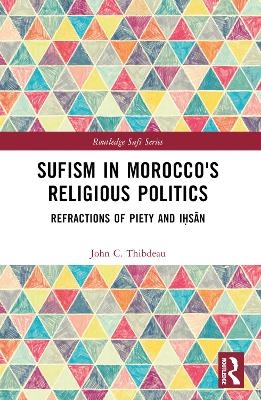
Sufism in Morocco's Religious Politics
Refractions of Piety and Iḥsān
Seiten
2024
Routledge (Verlag)
978-1-032-47843-2 (ISBN)
Routledge (Verlag)
978-1-032-47843-2 (ISBN)
- Lieferbar (Termin unbekannt)
- Versandkostenfrei
- Auch auf Rechnung
- Artikel merken
This book outlines the role of Sufism in Moroccan politics in the twenty-first century through a comparative study of contemporary Sufi organizations.
The author begins his analysis by highlighting the strategies employed by the Moroccan state over the past twenty years, aimed at regulating and producing an authorized ‘Moroccan Islam’ in the kingdom. Despite these policies of spiritual security and spiritual diplomacy, including the state sponsorship of Sufi organizations, the author argues that this has not decreased diversity nor produced a banal interpretation of Islam, but rather given rise to diverse articulations and performances of this religiosity. Through a comparative analysis of three Sufi organizations based on eighteen months of fieldwork – two of which have never before been studied – the author brings into relief the spaces of creative enactment of Sufism as an ethical tradition. Ultimately, it is argued that each Sufi organization reflects a different refraction of iḥsān, a concept emphasising the cultivation of public piety which underpins the Moroccan state’s formulation of Islam.
Focused on both theoretical contributions to Islamic studies and topical treatments of geopolitical issues like spiritual diplomacy, the Western Sahara, and Morocco-Algeria, the book spans multiple disciplines, including anthropology, religious studies, sociology, and political science.
The author begins his analysis by highlighting the strategies employed by the Moroccan state over the past twenty years, aimed at regulating and producing an authorized ‘Moroccan Islam’ in the kingdom. Despite these policies of spiritual security and spiritual diplomacy, including the state sponsorship of Sufi organizations, the author argues that this has not decreased diversity nor produced a banal interpretation of Islam, but rather given rise to diverse articulations and performances of this religiosity. Through a comparative analysis of three Sufi organizations based on eighteen months of fieldwork – two of which have never before been studied – the author brings into relief the spaces of creative enactment of Sufism as an ethical tradition. Ultimately, it is argued that each Sufi organization reflects a different refraction of iḥsān, a concept emphasising the cultivation of public piety which underpins the Moroccan state’s formulation of Islam.
Focused on both theoretical contributions to Islamic studies and topical treatments of geopolitical issues like spiritual diplomacy, the Western Sahara, and Morocco-Algeria, the book spans multiple disciplines, including anthropology, religious studies, sociology, and political science.
John C. Thibdeau is a Visiting Assistant Professor of Islamic Studies in the Department of Religion and Classics at the University of Rochester. He completed his PhD at the University of California, Santa Barbara in Religious Studies in 2021.
1. Introduction: Iḥsān and Practical Sufism 2. Three Histories of Sufism and Politics in Morocco 3. A Visionary Order: Shaykh Fawzi and the Karkariyya 4. Pilgrimage and Politics in the Karkariyya 5. Sufism and the Neoliberal Ethic in the IACSAS 6. Bringing the Zawiya into the World with the 'Alāwiyya 7. Lenses of Refraction: Conclusion
| Erscheinungsdatum | 11.07.2023 |
|---|---|
| Reihe/Serie | Routledge Sufi Series |
| Verlagsort | London |
| Sprache | englisch |
| Maße | 156 x 234 mm |
| Gewicht | 560 g |
| Themenwelt | Geisteswissenschaften ► Religion / Theologie ► Islam |
| Sozialwissenschaften ► Politik / Verwaltung | |
| ISBN-10 | 1-032-47843-8 / 1032478438 |
| ISBN-13 | 978-1-032-47843-2 / 9781032478432 |
| Zustand | Neuware |
| Haben Sie eine Frage zum Produkt? |
Mehr entdecken
aus dem Bereich
aus dem Bereich


